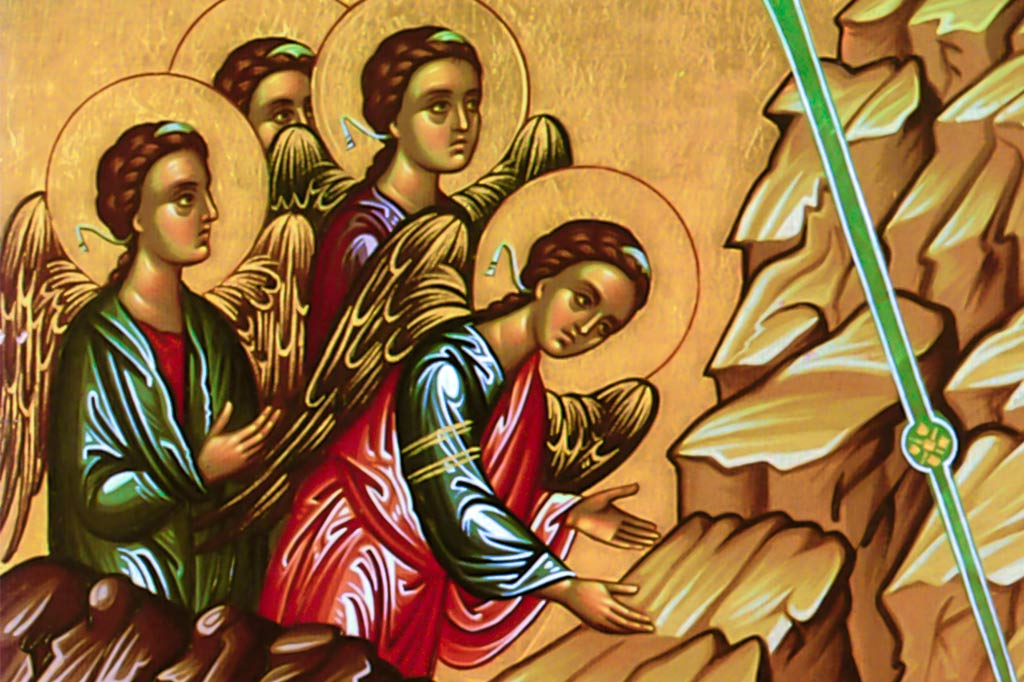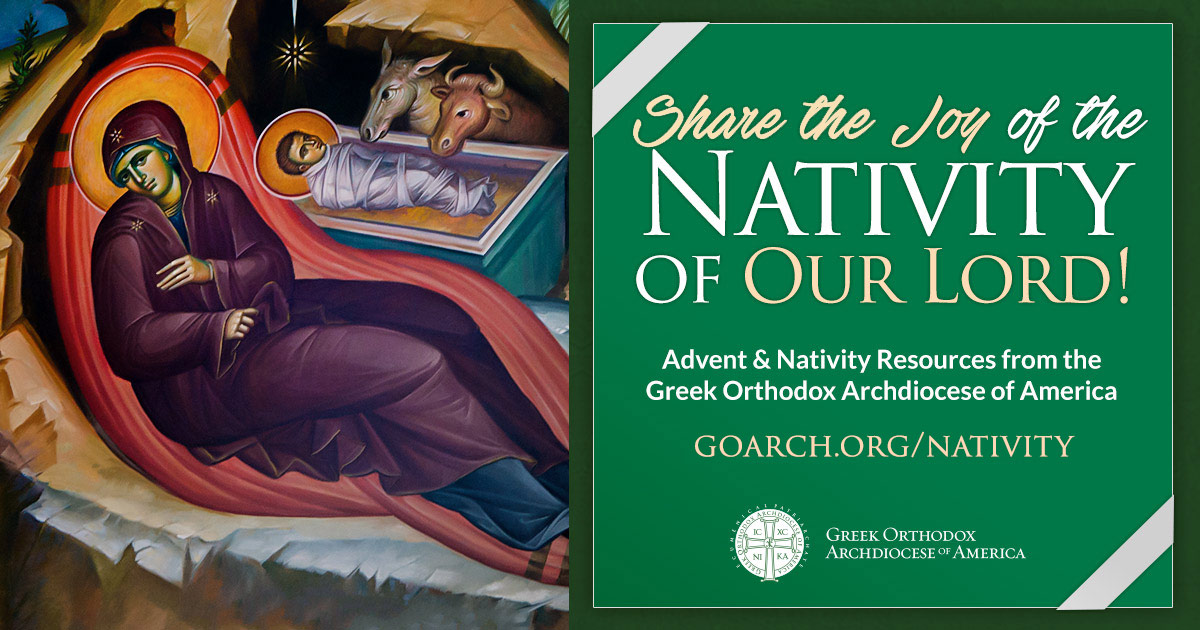And the angel said to them, ''Be not afraid, far I bring you good news of a great joy which will come to all the people." -Luke2:10
What is the good news? In the Nativity story, the Angels gave the message, "For to you is born this day in the city of David, a Savior who is Christ the Lord (Luke 2: 11 )."
What does that mean to us?
Let's go back to Genesis and the Creation. In Genesis 2:7 we read, "Then the Lord God formed man of dust from the ground, and breathed into his nostrils the breath of life; and man became a living being." What God breathed into the human being was a soul. The body was taken from the dust of the ground, and given a soul. The human being is composed of mind, body and soul, with the soul being tied to the mind because we are rational beings. Only the human being has a soul, no other created entity has a soul. The soul is what makes us in the "image and likeness" of God (Gen. 1:26-27). Indeed this was good news.
Remember the first thing you need to believe to be a Christian-that God made us, and that He made us like Him. He made us perfect. He created us to live forever.
When mankind fell, through ingratitude and disobedience, God punished mankind. In Genesis 3:19, we read that God told man: "In the sweat of your face you shall eat bread till you return to the ground, for out of it you were taken; you are dust, and to dust you shall return.”
This is sad news. To think that beautiful human beings, who are so filled with talent, were sharing a common destiny of being returned again to the earth after we die. And the God-like part of us, the soul, which will live forever, like God, suffered an even worse fate. For the soul, its life did not end with physical death. Rather the soul was consigned to Hades, to darkness, to live forever with the devil that deceived humanity into falling in the first place.
If you go back to your days of high-school algebra, we all learned how to balance an algebra equation. We did it by doing the same thing to both sides of the equation. Well, if you look at the Creation of the world like an algebra equation, when the human being was created in the image and likeness of God, you could say that the equation was balanced between God and man. Obviously man cannot be equal to God because God created man. The Fall unbalanced the equation, because now on man's side of the equation, there was hardship, disease, and ultimately death and a descent to Hades.
With the Incarnation, Christ came down to earth to balance the equation. He experienced all of the human experiences. He got hungry and wanted to eat from a fig tree (Matt. 21: 18). He got tired and asked a woman at a well for water (John 4:6). He got angry at the moneychangers in the temple (John 2:15). He was afraid as He meditated on His own death (Matt. 26:39). He got sad, and wept at the tomb of His friend Lazarus (John 11:35 ).
Christ experienced a human death, and a painful one at that. He died on the cross. And in that moment, the equation was balanced, because now the Son of God had experienced the punishment of death given to the fallen humanity. Jesus also descended to Hades. But then He rose from the dead, ascended into heaven and sat at the right hand of the Father, with the "glory which I had with Thee before the world was made" (John 17:5).
When Jesus died on the cross, He expressed perfect faith in God when He said, "Father into Thy hands I commit my spirit (Luke 23:46)!" Our goal in life is to reach the end of life with this kind of perfect faith in God, demonstrated through our works, and then by His Grace, we too can be resurrected, ascend to heaven, and sit at the right hand of the Father. Once we get to heaven, the equation of us with God stays balanced forever, for we are told that heaven is permanent. Once one is there, he cannot fall out of heaven (Luke 16:26).
The good news for us is that despite our fallen nature, we can still become one with God. No one has to die a violent death in order to do this. We have to love God, and love our neighbor. We have to be kind, show mercy, forgive, all things that we are more than capable of doing. We have to believe and trust in God. These things are a little harder. But the good news is that we have our whole life to figure this out. The bad news is that we do not know how long that life will be.
Jesus expressed in His Prayer to God the Father, on behalf of humanity, that He offered in the Garden of Gethsemane before His Passion, what His hope was for all of us, when He prayed: "Father, I desire that they also, whom Thou hast given Me, may be with Me where I am, to behold My glory which Thou hast given Me in Thy love for Me before the foundation of the world (John 17:24)."
There you have the good news. Christ wants us to behold His glory and to be with Him in Paradise, the way Adam and Eve were before the Fall. That is what He wanes for all of us. He has given us the path to get there. His Resurrection from the dead makes that possible. His incarnation makes the resurrection possible. What great news indeed!
Christ is born; therefore glorify! Christ is come from heaven; go and meet Him. Christ is on earth; arise to Him. Sing to the Lord, all you who dwell on the earth; and in merry spirits, 0 you people, praise His birth. For He is glorified. (Katavasias of the Nativity, Trans. Fr. Seraphim Dedes)
Have a great day!
We encourage you to participate in this journey guided by Fr. Stavros in two ways:
- Purchase the book "Let All Creation Rejoice: Reflections for Advent, the Nativity and Epiphany" by Fr. Stavros N. Akrotirianakis
- Visit The Prayer Team Daily Devotion available through the Orthodox Christian Network
About Advent or the Nativity Fast
Most Christian churches have a period of time called “Advent.” Advent is conventionally observed as a four-Sunday period before the feast of Christmas. In the Orthodox Christian Church, Advent is observed for forty days beginning on November 15. In the Orthodox Church the Feast of Christmas is called by various names including “The Nativity” and “The Incarnation.” The term “Christmas” is seldom heard in Orthodox Christian circles. The Feast of the Nativity is celebrated for twelve days culminating in the Feast of Epiphany, or Theophany, as it is sometimes called.
About "Let All Creation Rejoice"

The book "Let All Creation Rejoice" has been written to be read on a daily basis from November 15 (the beginning of the Orthodox Advent season), through January 7 (the Feast of St. John the Baptist which falls one day after the Feast of Epiphany, which is held January 6).
The reflections of Advent focus on a verse or two from the scriptures on the Nativity, taken from Matthew 1 and 2, and from Luke 2. The reflections that follow the Feast of the Nativity focus on other scriptures related to the early life of Christ, culminating in His Baptism and the endorsement of St. John the Baptist.
Each reflection concludes with a hymn or prayer from Orthodox Christian services held for the Feasts of the Nativity and Theophany.
About Fr. Stavros
Fr. Stavros Akrotirianakis is the Proistamenos (Presiding Priest) at St. John the Baptist Greek Orthodox Church in Tampa, FL. The Prayer Team Ministry, a daily reflection authored by Fr. Stavros which began in February 2015, has produced two books, "Let All Creation Rejoice: Reflections for Advent, the Nativity and Epiphany" and “The Road Back to Christ: Reflections on Lent, Holy Week and the Resurrection."

